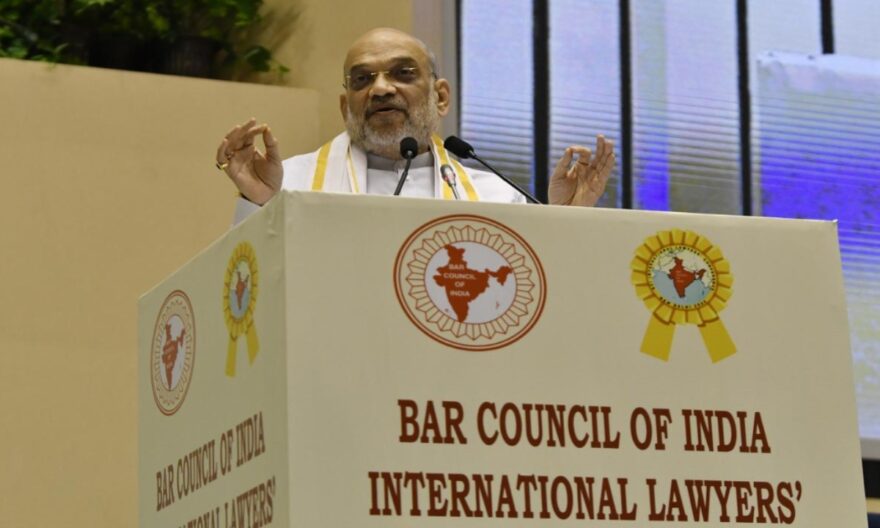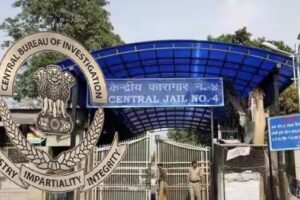
Sunday on 24 September, The Union Home Minister Amit Shah emphasized that the three proposed laws are centered on the welfare of the people, reflecting the essence of Indian values, and their primary objective is to safeguard the constitutional, human, and personal rights of citizens.
Speaking at the two-day International Lawyers’ Conference organized by the Bar Council of India, Shah also highlighted that the focus of the three bills is on delivering justice rather than merely imposing punishment.
“The purpose of enacting laws is to establish an efficient system, not to promote the dominance of those creating the laws,” Shah stated at the event, which was attended by esteemed Supreme Court judges, including Justice Sanjeev Khanna, Justice Sanjay Kishan Kaul, and Justice PS Narasimha, among others.
He urged all lawyers across the country to offer their valuable suggestions for the Bharatiya Nyaya Sanhita (BNS-2023), Bharatiya Nagarik Suraksha Sanhita (BNSS-2023), and the Bharatiya Sakshya Adhiniyam (BSA-2023), in order to create the best laws that benefit the entire nation.
The three bills, introduced in the Lok Sabha on August 11, are set to replace the Indian Penal Code, 1860, the Criminal Procedure Act, 1898, and the Indian Evidence Act, 1872, respectively.
Shah emphasized, “India’s criminal justice system was deeply influenced by colonial law. However, all three new bills are devoid of colonial influence and instead resonate with the essence of Indian culture. The central objective of these proposed laws is to protect the constitutional and human rights of citizens, as well as their personal rights.”
Shah underlined that this initiative aims to comprehensively reform criminal laws in accordance with contemporary demands. “These laws are being introduced after nearly 160 years with an entirely fresh approach and system,” he added, highlighting three additional government initiatives to create a law-friendly ecosystem.
The first initiative is the introduction of e-courts, the second is the interoperable Criminal Justice System (ICJS), and the third involves incorporating new technology into these three proposed laws. Shah expressed confidence that with these three laws and systems, the delays in the criminal justice system can be eliminated in less than a decade.
He stressed that the primary objective of the old laws was to reinforce British rule and punish rather than deliver justice. “The aim of these three new laws is to ensure justice, not punishment. This represents a significant step towards achieving criminal justice,” Shah stated. He noted that the new laws propose substantial changes in the old laws and promote the integration of technology. The definition of documents has been significantly expanded, and electronic and digital records now receive legal recognition. Summons will be considered valid in various electronic formats, from SMS to email.
The Home Minister disclosed that new provisions have been introduced to address mob lynching cases, while the section related to sedition has been abolished. Furthermore, these new laws will also legalize community service.
He highlighted the section numbers in the Indian Penal Code, Criminal Procedure Code, and Indian Evidence Act that will be replaced by the Bhartiya Nyaya Sanhita, Bharatiya Nagarik Suraksha Sanhita, and Bharatiya Sakshya Adhiniyam, respectively.
Shah appealed to lawyers across the country to thoroughly examine these bills and provide their suggestions. He emphasized the importance of stakeholder consultation, a principle upheld by Prime Minister Narendra Modi, to perfect any law.
The Home Minister concluded by stating that complete justice can only be comprehended by studying laws that touch every aspect of society. He stressed the importance of balance between justice and all forms of power in creating a just society.
Under the leadership of Prime Minister Narendra Modi in the last nine years, Shah noted that India has made efforts to revise or create new laws to meet contemporary needs. Changes to laws such as the Arbitration Law, Mediation Law, and the Jan Vishwas Bill have been introduced to alleviate the burden on the judiciary.
Shah concluded by mentioning that laws are not static but evolve with changing times and emerging issues, ensuring their continued relevance and suitability.
At the conference, the Bar Council of India honored senior advocates K Parasaran, Fali S Nariman, K K Venugopal, and posthumously recognized senior advocates Soli J Sorabjee and Ram Jethmalani. Shah presented awards to Nariman and Venugopal, while Satish Parasaran accepted the award on behalf of his father K Parasaran. The awards for Jethmalani and Sorabjee were received by their family members.





